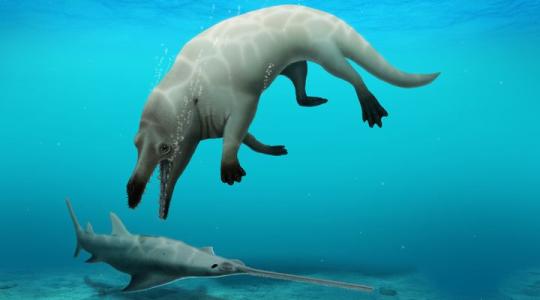
Image: Dr. Robert W. Boessenecker
Scientists in Egypt have announced that they have discovered the fossilized bones of a previously unknown amphibious, four-legged species of an ancestral whale. The semiaquatic whales called protocetids, existed over forty million years, during the Eocene period, according to findings published Wednesday in the peer-reviewed journal Proceedings of the Royal Society B. Since protocetids were amphibious, they represent a unique period in whale evolution that largely still remains a mystery.
The researchers behind the study believe the newly discovered fossil offers clues as to how whales transformed from land-dwellers to the sea creatures we know today.
“All known protocetid whales had well-developed, non-reduced fore and hind limbs that could bear the animals’ weight outside of water, albeit probably awkwardly, as these animals were probably quite heavy,” Robert W. Boessenecker, co-author of the study, told HuffPost. “Think of seals and sea lions, for example.”
What sets this four-legged creature apart from other protocetid whales is an impressively murderous, jackal-like jaw that allowed it to have a “raptorial feeding style,” according to the study. The researchers, who analyzed the fossil at Mansoura University, named the species “Phiomectus anubis” after Anubis, the jackal-headed Egyptian god of death.
Scientists in Egypt say they’ve discovered the bones of an amphibious, four-legged whale
